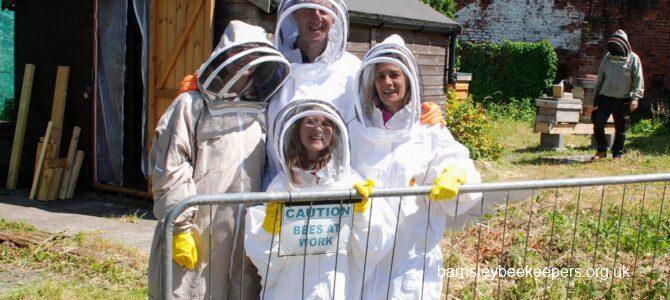On Saturday 25th June, Barnsley Beekeepers’ Association had the pleasure of showing v and his family around the association apiary. Dan donned a protective bee suit and joined members to explore the world of the honey bee. It was a fantastic opportunity to talk to our MP about how Barnsley’s general public interact with bees. Two swarms have been unnecessarily killed by Barnsley residents this year, including one that had a beekeeper en route!
Swarming is the result of the natural process of expansion by bees with swarms leaving established nests or hives to set up home elsewhere. Bees have been doing this for millions of years. The swarm is normally composed of a queen, several thousand worker bees (all female) and a number of drones (male bees). A swarm of honey bees can vary in size and be from something like 2 or 3 thousands bees to 20 or 30 thousand. The number of bees in a swarm tends to be related to the size of the original colony from where it has come and how many swarms have left the colony before.
Swarming season is typically between early May and late July and if members of the public see a swarm of bees in a bivouac (a tightly clustered ball), they should contact a beekeeper before the swarm moves into a cavity to take up residence. The cavity could be your house eaves or chimney, so act quickly as the bivouac doesn’t tend to hang around long and it’s a specialist job removing bees once they have an established brood nest.
Another topic discussed with Mr Jarvis was people getting colonies of bees and then finding out about how to manage them: this is the wrong way around. Beekeeping is husbandry; long gone are the days when you can have an unmanaged hive of bees at the bottom of your garden that never gets looked at. If you are considering beekeeping as a hobby, you must do your research and handle some bees before jumping in with both feet (or six tarsi if you are a bee!). Beekeeping can be a very rewarding hobby, but you need to invest time in learning about the craft. A chat about the nasonov gland can be a real conversation stopper at parties!
Finally, Dan was surprised to hear that in 2021, beekeepers in Great Britain had imported 14,021 queens: 5552 of which had come from Italy which is engaged in its own battle with the devastating Small Hive Beetle which decimates hives. We must be more self-sustainable in our beekeeping practices and ween off our reliance on imported queens which can pose a biohazard, security risk to not only our honey bees but to other species of bee.
Barnsley BKA is a buzz with new members following an excellent lockdown, virtual offer for its members. We rocketed from around 40 members to now supporting 87 members through practical apiary sessions, social media forums and a packed winter program.
If you are interested in finding more about bees or beekeeping, waggle-dance over to the association website barnsleybeekeepers.org.uk or see us at Penistone Show on September 10th.

